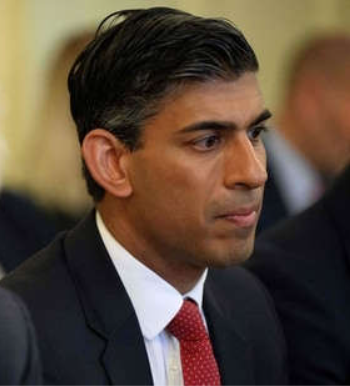London View: Rishi Sunak’s Bandwagon Slowing to A Stop And There’s No Second Wind Coming

Nobody is quite waiting for September 5 for a formal determination that Rishi Sunak has lost his bid to become prime minister of Britain. It was a difficult bid from the start. Britain is not the United States, and Rishi Sunak is no Barack Obama. But over weeks of campaigning, his chances have become more and more bleak.
And it is showing. In the opinion polls certainly. One of the latest among party members from YouGov has Liz Truss with 68 per cent support to Sunak’s 32 per cent. He started only slightly behind, and at moments marginally ahead by some estimates. But he has been on a steady slide since then.
The betting odds are more stark. Those are not grading support, they look only for the winner. Their odds give Liz Truss a 95 per cent chance to win, and few are risking a theoretically grand reward from betting on a Sunak win from a 5 per cent position.
Rishi Sunak is looking at these figures no doubt, and he clearly has his own feedback. It seems all to tell him he has lost it, and it shows. Through the hustings where both candidates are looking to present their case to party members, Rishi Sunak has lost the earlier oomph, the starting enthusiasm. The energetic new ideas of the early days have given way to rehearsed repetition.
So his lines about Britain welcoming his family to Southampton, his belief in family values and hard work that were impressive for a start, soon became clichés, and these have now only staled further. On his economic plans enough has been said and enough heard, even though these remain far more convincing than Liz Truss’s dangerously dubious proposals for tax cuts as the way out. Rishi Sunak is clearly more to be trusted on the economy, but party members are choosing less and less to do so.
Unscalable odds
Sunak’s bet is that the party, and the country with it, will regret its choice of Truss. It’s a good bet, almost as good as the 95 per cent bet that he will not win. Since the start of the campaign, inflation has risen from about 9 per cent to above 10 per cent. The Bank of England predicted earlier that it will go above 13 per cent and stay that way until at least the end of next year. The newest independent predictions see it rising to 18 per cent, and no one is predicting these will be the last. The price of essential foods like bread and milk has risen 18 per cent already.
The building economic crisis will mark Liz Truss’s term as prime minister. The next general election is due in early 2024. The build-up to that election will do nothing for Liz Truss’s popularity, or that of the Conservative Party. Some Sunak supporters are hoping that this slide in her popularity will smoothe the way for a Sunak comeback before the next election.
That hope is as unlikely as a Sunak win this time. No visible mechanism appears on the horizon for another similar contest where Sunak could launch a comeback. And the backbenches where he could be headed after this loss are not the best place to make a fresh start. Rishi Sunak’s head start was his position as Chancellor of the Exchequer (as Britain calls its finance minister). Without that pedestal to stand on, his stature will fall, and with it his chances.
The Johnson factor
Giving Sunak a prominent place in a new cabinet would be a high-risk choice for Truss. No one could be sure now that Sunak will not begin plotting against a benefactor behind his, or her back. Within the party, he is up more against Boris Johnson than his protégé Truss even though she would be the Prime Minister.
Boris Johnson is immensely popular within the Conservative Party. Poll after poll suggests, and hustings after hustings demonstrate, that given a choice, party members would pick Johnson and neither Sunak nor Truss. But Truss has remained consistently loyal to Johnson, and that is seen by party members. That perceived loyalty is where much of her support comes from.
Sunak can see that of course. He has admitted publicly now that he has tried to reach out to Johnson but Johnson has not responded, a decision Sunak says he can understand. But it’s not a decision that helps him. And it’s not a decision that is likely to change. Boris Johnson is not likely to betray Truss to give Sunak a second chance to now get rid of his protégé. Nor will party members do that for Sunak against Johnson-Truss. Sunak has lost this chance, and he will struggle to find a second.







